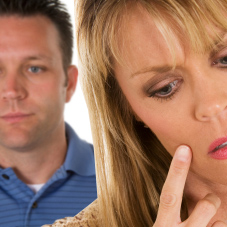





|
He Said, She Said, We Said
Ann Weber, Ph.D.
 Divorced after a 12-year marriage, Perry hesitated to date again
-- he wasn't even sure you still use the word "date." But when he met Meg he felt an instant rapport. Now, on their second date, he
feels like he's known her forever. Meg's a good listener, she laughs at his jokes. Encouraged by her warmth, Perry is eager to get closer
to Meg. Divorced after a 12-year marriage, Perry hesitated to date again
-- he wasn't even sure you still use the word "date." But when he met Meg he felt an instant rapport. Now, on their second date, he
feels like he's known her forever. Meg's a good listener, she laughs at his jokes. Encouraged by her warmth, Perry is eager to get closer
to Meg.
Finishing their meal, they chat comfortably about a new movie.
"I thought the character of the depressed mother was very realistic," Meg says.
Perry sees a chance to confide in Meg. "It was a realistic portrayal," he admits, and lowering his voice: "You know my own
mother was very depressed. She took her own life. I was just a little boy but I remember. It messed me up for a long time."
Meg is quiet a moment. To Perry's surprise, she abruptly changes the subject. Reaching for her jacket, she says, "Gosh,
Perry, there's our waiter, could we get the check? I've got a long day tomorrow and I really ought to get home."
"Uh, sure," Perry replies, rising from his chair. He feels awkward and embarrassed. He just told her something pretty personal,
but she didn't react, not sympathetically at least. If anything, she seems to have backed off. What did he do wrong?
What if, early in your relationship, one of you is ready to get closer but the other is not? How do people indicate their wishes to get closer -- or stay
distant?
 "I can't believe you said that about me being fat -- right in
front of our friends!" Now that they've left the party and are alone again in their car, Michelle speaks softly but angrily. "I can't believe you said that about me being fat -- right in
front of our friends!" Now that they've left the party and are alone again in their car, Michelle speaks softly but angrily.
"What?" Doug asks, surprised. "I didn't say anything about you being fat."
"You did," mutters Michelle. "When dessert came. Just when Henry announced it was time for cheesecake. I started to walk over
to the buffet and you stopped me. Right in front of everyone. You said, 'You need to be on a diet'! I was so embarrassed."
"Ohh," sighs Doug. "Come on, honey. No one heard me, I didn't say it loud. And what I asked you was, 'Didn't you say you were
going on a diet?'"
"It's the same thing. And how do you know no one heard you? I feel very self-conscious about my weight. You really upset me,"
cries Michelle.
"I'm sorry, Michelle, I didn't intend to upset you," Doug says. "Just today you said you wanted to go on a diet. I haven't been
nagging you, remember. I love you just as you are. I know it's important to you, but it's tough to lose weight, and I want to help.
I was afraid you'd have dessert tonight and then regret it. I was only trying to help."
"Well, I felt embarrassed."
"I didn't mean to embarrass you, honey," Doug whispers. "I meant to be helpful. If I embarrassed you, then I said the wrong
thing. I'm sorry."
"Well," Michelle says, "okay. But if it comes up again, take me aside, okay? And talk to me privately. I'm probably being too
sensitive. But comments about my weight just seem to hit me the wrong way."
When you speak to your partner, how can you be sure your words are having the intended effect? When
you're listening, how can you be sure you're hearing your partner's words and not reading into them?"
 Tim grabs his bag lunch from the kitchen counter and heads out
the door for work. "Have a great day," says Deb, "and remember I love you." Tim grabs his bag lunch from the kitchen counter and heads out
the door for work. "Have a great day," says Deb, "and remember I love you."
"Thanks, honey -- I'll see you tonight."
"Wait, says Deb, "I just said 'I love you.' How come you never say you love me?"
"Oh, c'mon, you know I do. I tell you that all the time," Tim assures her.
"You don't! When was the last time you said you loved me?" Deb demands.
"Oh, come on-just last weekend, I washed your car, didn't I?"
"That's not the same! If you really loved me, you'd say the words."
"Yeah," rebuts Tim, "well, if you really loved me, you wouldn't pack me tuna for lunch. You're the one who likes tuna. You
know I hate tuna sandwiches!"
When it comes to love, do actions speak louder than words? Or do we need to use words when we say, "I
love you"?

|



